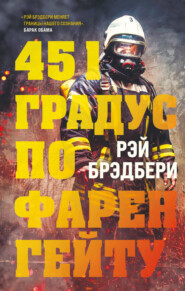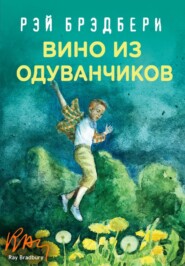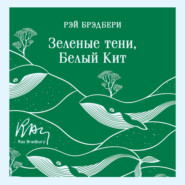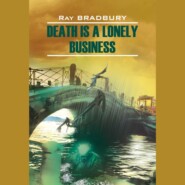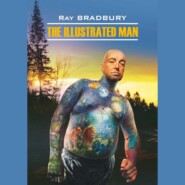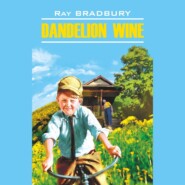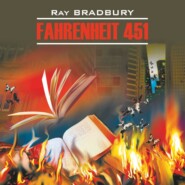По всем вопросам обращайтесь на: info@litportal.ru
(©) 2003-2025.
✖
Long After Midnight
Автор
Год написания книги
2018
Настройки чтения
Размер шрифта
Высота строк
Поля
“What’s wrong with you?” she asked.
“Nothing,” I said. “’Bye. So long, Dad.”
Everybody said good-bye. I walked to school, thinking deep inside, like shouting down a long, cold well.
I ran down through the ravine and swung on a vine, way out; the ground dropped away, I smelled the cool morning air, sweet and high, and I screamed with laughter, and the wind threw away my thoughts. I tossed myself in a flip against the embankment and rolled down as birds whistled at me and a squirrel hopped like brown fuzz blown by the wind up around a tree trunk. Down the path the other kids fell like a small avalanche, yelling. “Ahh—eee—yah!” Pounding their chests, skipping rocks on the water, jumping their hands down to catch at crayfish. The crayfish jetted away in dusty spurts. We all laughed and joked.
A girl passed by on the green wooden bridge above us. Her name was Clarisse Mellin. We all hee-hawed at her, told her to go on, go on, we didn’t want her with us, go on, go on! But my voice caught and trailed off, and I watched her going, slowly. I didn’t look away.
From way off in the morning we heard the school bell ring.
We scrambled up trails we’d made during many summers over the years. The grass was worn; we knew each snake hole and bump, each tree, every vine, every weed of it. After school we’d made tree huts here, high up over the shining creek, jumped in the water naked, gone on long hikes down the ravine to where it emptied lonely and abandoned into the big blue of Lake Michigan, near the tannery and the asbestos works and the docks.
Now, as we panted up to school, I stopped, afraid again. “You go on ahead,” I said.
The last bell tolled. The kids ran. I looked at the school with vines growing on it. I heard the voices inside, making a high, all-the-time noise. I heard little desk bells tinkle and sharp teacher voices reaching out.
Poison, I thought. The teachers, too! They want me sick! They teach you how to be sicker and sicker! And—and how to enjoy being sick!
“Good morning, Douglas.”
I heard high-heeled shoes on the cement walk. Miss Adams, the principal, with her pince-nez and wide, pale face and close-cropped dark hair, stood behind me.
“Come along in,” she said, holding my shoulder firmly. “You’re late. Come along.”
She guided me, one two, one two, one two, upstairs, up the stairs to my fate….
Mr. Jordan was a plump man with thinning hair and serious green eyes and a way of rocking on his heels before his charts. Today he had a large illustration of a body with all its skin off. Exposed were green, blue, pink, and yellow veins, capillaries, muscles, tendons, organs, lungs, bones, and fatty tissues.
Mr. Jordan nodded before the chart. “There’s a great similarity between cancer and normal cell reproduction. Cancer is simply a normal function gone wild. Overproduction of cellular material—”
I raised my hand. “How does food—I mean—what makes the body grow?”
“A good question, Douglas.” He tapped the chart. “Food, taken into the body, is broken down, assimilated, and—”
I listened and I knew what Mr. Jordan was trying to do to me. My childhood was in my mind like a fossil imprint on soft shale rock. Mr. Jordan was trying to polish and smooth it away. Eventually it would all be gone, all my beliefs and imaginings. My mother changed my body with food, Mr. Jordan worked on my mind with words.
So I began to draw pictures on paper, not listening. I hummed little songs, made up a language all my own. The rest of the day I heard nothing. I resisted the attack, I counteracted the poison.
But then after school I passed Mrs. Singer’s store and I bought candy. I couldn’t help it. And after I ate it I wrote on the back of the wrapper: “This is the last candy I’m going to eat. Even at the Saturday matinee, when Tom Mix comes on the screen with Tony, I won’t eat candy again.”
I looked at the candy bars stacked like a harvest on the shelves. Orange wrappers with sky-blue words saying “Chocolate.” Yellow and violet wrappers with little blue words on them. I felt the candy in my body, making my cells grow. Mrs. Singer sold hundreds of candy bars each day. Was she in conspiracy? Did she know what she was doing to children with them? Was she jealous of them being so young? Did she want them to grow old? I wanted to kill her!
“What you doing?”
Bill Arno had come up behind me while I was writing on the candy wrapper. Clarisse Mellin was with him. She looked at me with her blue eyes and said nothing.
I hid the paper. “Nothing,” I said.
We all walked along. We saw kids playing hopscotch and kick the can and playing mibs on the hard ground, and I turned to Bill and I said, “We won’t be allowed to do that next year, or maybe the year after.”
Bill only laughed and said, “Sure, we will. Who’ll stop us?”
“They will,” I said.
“Who’s they?” asked Bill.
“Never mind,” I said. “Just wait and see.”
“Aw,” said Bill. “You’re crazy.”
“You don’t understand!” I cried. “You play and run around and eat, and all the time they’re tricking you and making you think different and act different and walk different. And all of a sudden one day you’ll stop playing and have to worry!” My face was hot and my hands were clenched. I was blind with rage. Bill turned, laughing, and walked away. “Over Annie Over!” someone sang, tossing a ball over a housetop.
You might go all day without breakfast or lunch, but what about supper? My stomach shouted as I slid into my chair at the supper table. I held on to my knees, looking down at them. I won’t eat, I told myself. I’ll show them. I’ll fight them.
Dad pretended to be considerate. “Let him go without supper,” he said to my mother, when he saw me neglect my food. He winked at her. “He’ll eat later.”
All evening long I played on the warm brick streets of town, rattling the tin cans and climbing the trees in the growing dark.
Coming into the kitchen at ten o’clock, I realized it was no use. There was a note on top of the icebox which said, “Help yourself. Dad.”
I opened the refrigerator, and a little cool breath breathed out against me, cold, with the smell of rimed foods on it. Inside was the wondrous half-ruin of a chicken. Members of celery were piled like cords of wood. Strawberries grew in a thicket of parsley.
My hands blurred. They made motions that caused an illusion of a dozen hands. Like those pictures of Eastern goddesses they worship in temples. One hand with a tomato in it. One hand grasping a banana. A third hand seizing strawberries! A fourth, fifth, sixth hand caught in midmotion, each with a bit of cheese, olive, or radish!
Half an hour later I knelt by the toilet bowl and swiftly raised the seat. Then, rapidly, I opened my mouth, and shoved a spoon back, back along my tongue, down, down along my gagging throat….
Lying in bed, I shuddered and tasted the acrid memory in my mouth, glad to be rid of the food I had so eagerly swallowed. I hated myself for my weakness. I lay trembling, empty, hungry again, but too sick, now, to eat….
I was very weak in the morning, and noticeably pale, for my mother made a comment on it. “If you’re not better by Monday,” she said, “to the doctor’s with you!”
It was Saturday. The day of shouting, and no tiny little silver bells for teachers to silence it; the day when the colorless giants moved on the pale screen at the Elite movie house in the long theater dark, and children were only children, and not things growing.
I saw no one. In the morning when I should have been hiking out along the North Shore Rail Line, where the hot sun simmered up from the long parallels of metal, I lolled about in terrific indecision. And by the time I got to the ravine it was already midafternoon and it was deserted; all of the kids had run downtown to see the matinee and suck lemon drops.
The ravine was very alone, it looked so undisturbed and old and green, I was a little afraid of it. I had never seen it so quiet. The vines hung quietly upon the trees and the water went over the rocks and the birds sang high up.
I went down the secret trail, hiding behind bushes, pausing, going on.
Clarisse Mellin was crossing the bridge as I reached it. She was coming home from town with some little packages under her arm. We said hello, self-consciously.
“What are you doing?” she asked.
“Oh, walking around,” I said.
“All alone?”
“Yeah. All the other guys are downtown.”






